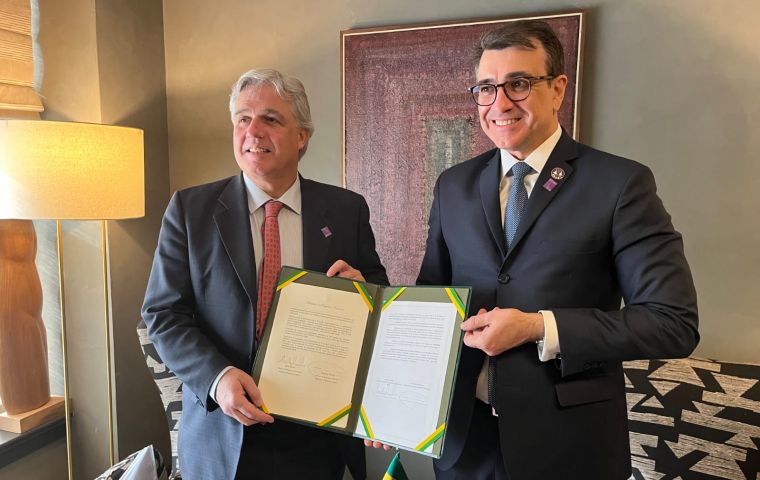MercoPress. South Atlantic News Agency
Uruguay, Brazil agree on zero-tariff for certain products
 The deal is tantamount to an FTA in some regards, according to many observers
The deal is tantamount to an FTA in some regards, according to many observers While the spotlight at the Summit of the Americas was focused on heads of state not shaking hands and some countries being excluded, the Foreign Ministers of Uruguay and Brazil agreed on a zero tariff in free trade zones and special customs areas for an unlimited period of time.
Although the agreement was signed last week in Los Angeles by Uruguay's Francisco Bustillo and Brazil's Carlos França, negotiations had begun several weeks ago.
The zero-tariff deal applies to all Uruguayan production in free trade zones and special customs areas, which is tantamount to “a free trade agreement with Brazil” for all industrial production from free-trade zones, according to Uruguay's El País.
Meanwhile, El Observador highlighted that Uruguay will be able to import yerba mate “in cases where maximum cadmium limits are found, thus exempting it from a Mercosur sanitary standard”. This measure is of great importance for Brasilia considering that the Uruguayan market represents 60% of its exports and that since 1994 production in free trade zones could not be sold with preferential tariffs in the Brazilian market.
The 6,195 products in the Mercosur tariff deal include beverages, medicines, cellulose, and chemical by-products. Medicinal cannabis is expected to be added shortly.
Bustillo and França also agreed that Mercosur needs greater flexibility that can be adjusted to “specificities” and respond to the “interests and sensitivities” of the countries included in the bloc. The Uruguayan official also brought up his country's opening up to negotiations with China and Turkey, among other possible markets.
The two ministers agreed that Mercosur's Common External Tariff (CET) “does not reflect the current needs of the bloc and that its reduction would contribute to increasing the competitiveness and productivity levels of its economies.” Although a percentage reduction requires the consensus of all the countries involved, Brasilia proposes a 20% reduction.
With this agreement, both governments resolved the disagreements that had limited the relationship in recent months, when Uruguay rejected Brazil's proposal -negotiated with Argentina and supported by Paraguay- to lower the block's CET by 10% for a list of 6,195 products. At the time, Uruguay's priority was to “flexibilize” the bloc then conditioned its support for the CET reduction on being explicitly enabled to negotiate with third parties bilaterally.




Top Comments
Disclaimer & comment rulesCommenting for this story is now closed.
If you have a Facebook account, become a fan and comment on our Facebook Page!